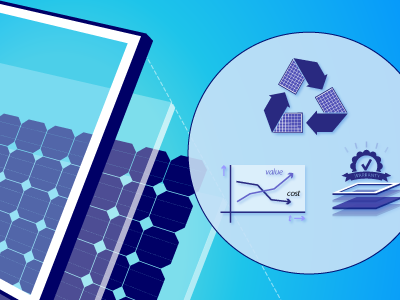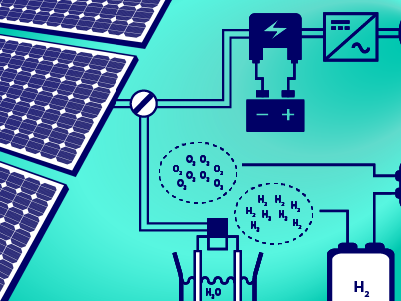Overview
Develop and design practical solutions for traditional and cutting-edge photovoltaic (PV) technologies. Gain expertise in material properties, fundamental concepts and design rules for high-efficiency solar cells, and processing technology.
This course presents the evolution of process technology from mature to emerging concepts for future PV devices. After completing the course you will be better able to design your solar materials, devices and modules, improve their efficiency and fully understand the sustainability aspects.
The renewable energy sector, including the PV technology field, is rapidly evolving with innovative device architectures and novel materials. How can these developments tackle performance losses? What is the environmental impact of traditional PV and what can be done to address any drawbacks? Can emerging PV materials and devices provide a solution for both performance and environmental problems?
The course will enable R&D researchers and process engineers, working in the field of solar cell and module technology development whether at manufacturers, equipment and material suppliers or labs to enrich their understanding of reliability and sustainability, and the technologies behind novel cell and module concepts from materials selection to device manufacturing.
After completing the course, you will have a better understanding of the working principles and processes of state-of-the-art and emerging high-efficiency solar cells. This knowledge will enable you to move towards achieving faster development of novel cell concepts and shorter time to market.
Take this course at your own pace!
This online course offers access to course material 24/7 so you can learn at the time and place that suits you.
This course can be started at any time from 17 September 2025 until 1 December 2025, and it will be closed for all participants on 10 December 2025. Please note that all assignments should be submitted before the end date in order to obtain the certificate.
What You'll Learn
- Gain application insights into the processing mechanisms (physics/chemistry), material properties, functionality and working principles of the novel functional coatings applied to different solar cell concepts.
- Identify performance losses, limiting factors and solutions that need to be addressed to maximize solar cell performance
- Practically optimize fabrication processes more effectively and/or optimally integrate them in the overall solar cell process sequence.
- Apply learned skills to tackle problems and challenges of both PV technologies that are currently available in the market and newly emerging PV concepts
- Identify the environmental impact of the choice of materials and the fabrication processes.
Details
Course Syllabus
Week 1: State-of-the-art Industrial Processing
- From Aluminium Back-Surface Field (Al BSF) cells towards Passivating Contacts
- Thin Films (including perovskites) and Tandems
- Quiz and Assignment on limiting factors: from Passivated Emitter and Rear Cells (PERC) to hybrid tandems
Week 2: Surface Passivation
- Chemical passivation and Field-effect passivation
- Dielectric layer materials
- Heterojunctions and Tunnel Oxide Passivating Contact (TOPCon) (principle, not processing)
- Quiz
Week 3: Solar Cells Part 1
- Contacting (Transparent Conducive Oxides (TCO), screen-printing and plating)
- TOPCon
- Silicon Heterojunction (SHJ)
- Bifacial solar cells
- Quiz
Week 4: Solar Cells Part 2
- Transparent (e.g., MetOx)
- Tandems (towards all perovskites)
- Quiz + Assignment
Week 5-6: Deposition technologies
- Plasma Enhanced Chemical Vapor Deposition (PECVD) and Low-Pressure Chemical Vapor Deposition (LPCVD)
- Physical Vapor Deposition (PVD) (reactive and non-reactive) and Pulsed Laser Deposition (PLD)
- Atomic Layer Deposition (ALD)
- Quiz
Qualifications
Certificates and CEUs
Professional education course with verified certificate.
The TU Delft Extension School offers Continuing Education Units for this course. Participants who successfully complete the course requirements will earn a Certificate of Completion and are eligible to receive 3.0 Continuing Education Units (3.0 CEUs).
Chartered Engineering Competences
All our online courses and programs have been matched to the competences determined by KIVI’s Competence Structure, a common frame of reference for everyone, across all disciplines, levels and roles.
These competences apply to this course:
- A1: Extend your theoretical knowledge of new and advancing technologies.
- E3: Undertake engineering activities in a way that contributes to sustainable development and a circular economy.
Admission
Understanding the physics behind solar cells, knowing how they generate electricity and knowledge of the design and processing methods of solar cells.
Contact
If you have any questions about this course or the TU Delft online learning environment, please visit our Help & Support page.


